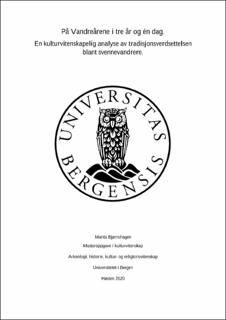På Vandreårene i tre år og én dag. En kulturvitenskapelig analyse av tradisjonsverdsettelsen blant svennevandrere
Master thesis

View/
Date
2021-01-15Metadata
Show full item recordCollections
- Master theses [241]
Abstract
The journeyman years (Wanderjahre) dates back to medieval times. The tradition is still practiced in several countries, such as Germany, today. There are different journeyman organizations, and this thesis is based on seven qualitative interviews and observations amongst travellers in the Vereinigung der rechtschaffenen fremden Zimmer- und Schieferdeckergesellen. Earlier research – of which there are surprisingly few recent ones - on the journeyman years has either focused on the history of the tradition, on how today’s organizations differ in their practice, on the individual experiences of journeymen travelling in different social and political time dimensions, or they’ve aimed to map out the entire course and contents of the journeyman years. The purpose of this master’s thesis is to examine the journeymen’s seemingly strong appreciation of tradition. After completing an apprenticeship as a craftsman, the young men voluntarily start on the journey for three years and one day to learn new working techniques, experience new countries and cultures, and to gather life experience. During this time they wear the traditional clothing, called Kluft, and they practice the traditional ‘medieval rules and rituals’ and follow the organization’s norms of behaviour– all this, seemingly, to keep the tradition alive. Through a ritual and tradition analysis, this thesis examines three obvious aspects of the tradition through the informants’ stories: their community, the rules and rituals, and their relationship to their handicraft professions. In addition, I examine the journeymen’s understanding of tradition. The result of this thesis shows that the journeymen’s strong appreciation of tradition must be understood through all the mentioned aspects within the journeyman years because they speak to them in different ways as individuals. I find that tradition – as a concept – is understood as a valuable thing itself both on a micro- and macro level in society. Furthermore, I find that the value of tradition, as it is expressed in my material, clearly reflects on typical understandings of tradition in today’s society.